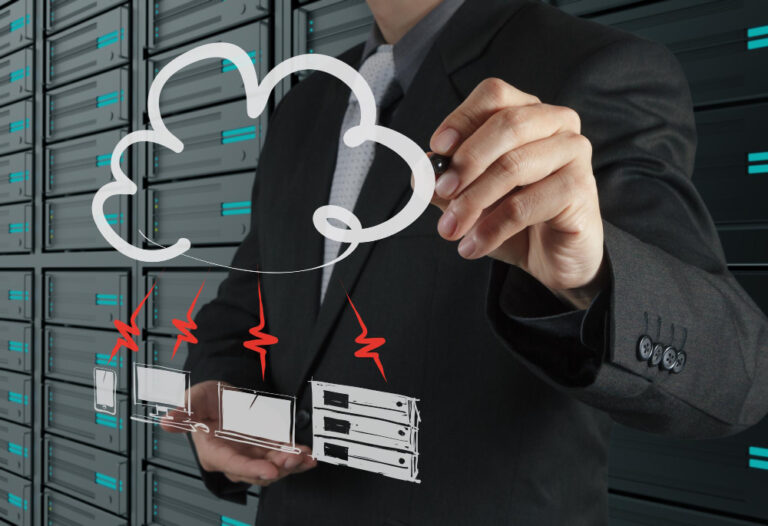Overview
In 2026, the data landscape for enterprises is more complex, interconnected, and vulnerable than ever before. With multi-cloud environments, hybrid workforces, and heightened compliance standards, enterprises cannot afford to take chances with data protection. As threats like ransomware grow in sophistication and regulatory penalties become more stringent, enterprise-grade cloud backup has shifted from a best practice to a non-negotiable business requirement.
The modern enterprise needs a backup solution that is not only secure and scalable but also flexible and intelligent. From handling petabytes of structured and unstructured data to ensuring data sovereignty across geographies, today’s cloud backup solutions are engineered for performance, resilience, and automation.
Enterprise cloud backup solutions also called enterprise data backup solutions—help businesses store, secure, and recover mission-critical data at scale.
This article explores the top 10 enterprise cloud backup services to watch in 2026, how to choose the right one, the risks of neglecting backup strategy, and why proactive IT support and MSP partnerships are vital for success.
What Are the Top 10 Enterprise Cloud Backup Services in 2026?
Here’s a curated list of the leading enterprise-grade cloud backup providers known for performance, scalability, and security:
The leading enterprise cloud backup service in 2026 is Microsoft Azure Backup, widely adopted for its scalability, enterprise integrations, and compliance readiness. However, several other providers excel in specialized areas such as security, AI-driven recovery, and hybrid deployment.
Here’s a comparison of the top enterprise cloud backup providers:
| Rank | Provider | Best For | Key Strengths |
| 1 | Microsoft Azure Backup | Large enterprises & Microsoft ecosystem | Scalability, compliance, seamless MS integration |
| 2 | Amazon AWS Backup | Multi-cloud & hybrid workloads | Automation, global infrastructure, strong security |
| 3 | Google Cloud Backup | AI-driven data recovery & analytics | Machine learning, speed, global reach |
| 4 | IBM Cloud Backup | Regulated industries | Compliance frameworks, security-first approach |
| 5 | Veeam Backup & Replication | Hybrid & multi-cloud environments | Flexibility, strong VM backup, automation |
| 6 | Commvault | Data-heavy enterprises | Advanced data management, analytics |
| 7 | Acronis Cyber Protect | Security-focused businesses | Integrated backup + cybersecurity features |
| 8 | Dell Technologies (Druva / PowerProtect) | Enterprises needing strong hardware integration | Scalable, hardware-software synergy |
| 9 | Cohesity | Enterprises prioritizing data resilience | Ransomware protection, multi-cloud management |
| 10 | Rubrik | Cloud-native enterprises | AI-driven recovery, zero-trust architecture |
- Veeam Backup & Replication: Industry-standard with hybrid cloud support
- Commvault Metallic: Cloud-native SaaS backup platform
- Acronis Cyber Protect: Integrated backup with cybersecurity
- Druva Data Resiliency Cloud: SaaS-based, scalable global backup
- Rubrik Cloud Data Management: Automation-focused, with ransomware protection
- Veritas NetBackup: Trusted by legacy enterprises
- Datto SIRIS: MSP-centric BCDR platform
- Unitrends Enterprise Backup: Purpose-built appliances and cloud replication
- Backblaze B2 for Business: Cost-efficient, scalable storage
- Carbonite Server Backup: Ideal for hybrid cloud environments
What Is an Enterprise Cloud Backup Service?
Enterprise cloud backup services offer large-scale data protection for mission-critical systems, ensuring business continuity and compliance. An enterprise cloud backup service, sometimes called enterprise backup to cloud or enterprise cloud-based backup solutions, provides large-scale data protection for mission-critical systems, ensuring business continuity and compliance.
- Backup of on-prem, virtual, and cloud workloads
- Scalable infrastructure to manage high-volume data
- Encryption, authentication, and audit trails
- Centralized dashboards for IT administrators
- Disaster recovery capabilities and failover readiness
- Support for multiple storage locations and formats
List of Top 5 Reliable Enterprise Cloud Backup Solution Providers
While many players exist, the top 5 enterprise cloud backup services based on market share, features, and enterprise focus stand out. Alongside these providers, businesses also rely on advanced enterprise backup tools to ensure data resilience, compliance, and seamless recovery:
- Veeam: Advanced orchestration, immutability, and replication features
- Commvault: Legacy strength with cloud-native innovations
- Rubrik: Fast, policy-driven automation and ransomware protection
- Druva: Fully SaaS, no infrastructure to manage
- Acronis: Integrated threat detection with backup
Top 10 Features of an Enterprise Cloud Backup Provider
When evaluating enterprise backup and recovery software and enterprise level backup solutions, organizations should focus on features that ensure security, scalability, compliance, and rapid recovery in mission-critical environments.
| Feature | Description |
|---|---|
| Scalability | Supports multi-PB workloads across sites |
| Multi-cloud compatibility | Integrates with AWS, Azure, GCP, VMware |
| Immutable backups | Prevents overwrite or deletion by ransomware |
| Centralized dashboard | Unified view of backups and alerts |
| Disaster recovery | Supports failover, testing, and orchestration |
| End-to-end encryption | Encrypts at rest and during transmission |
| Role-based access control | Ensures accountability and access limitation |
| File versioning | Enables rollback to earlier file states |
| AI/ML anomaly detection | Identifies suspicious data patterns |
| Compliance readiness | Aligns with HIPAA, GDPR, ISO 27001, DPDP |
How to Choose a Reliable Enterprise Cloud Backup Software
Making the right decision involves a mix of technical evaluation, vendor credibility, and organizational alignment.
- Evaluate compatibility with current infrastructure
- Check for automation and policy-based backup options
- Assess speed of recovery and RTO/RPO metrics
- Ensure compliance and data sovereignty support
- Review vendor SLAs and customer success metrics
- Ask for proof-of-concept and sandbox trials
Few Reasons Why Businesses Should Choose Enterprise Cloud Backup Solutions
From operational agility to data resilience, enterprise cloud backup enables future-ready infrastructure.
- Reduces the risk of costly downtime
- Simplifies compliance audits and reporting
- Scales without costly on-prem storage expansions
- Improves responsiveness during cyber incidents
- Supports remote work and BYOD setups
- Minimizes reliance on manual backup processes
Key Disadvantages of Not Having a Cloud Backup Solution
Without robust backup, businesses face operational, financial, and reputational damage. Investing in enterprise backup and recovery and modern data backup solutions for enterprise helps organizations safeguard mission-critical data and ensure continuity.
- Vulnerability to ransomware attacks
- Loss of customer trust and business continuity
- Regulatory non-compliance and penalties
- Higher data recovery costs
- Inability to restore in time-critical scenarios
- Increased administrative and legal burden
Key Benefits of an Enterprise Backup Solution
Investing in a proven backup solution leads to tangible business benefits.
- Ensures business continuity during outages or attacks
- Enhances data protection posture
- Reduces IT overhead with automation
- Provides audit logs for regulators and stakeholders
- Enables hybrid and remote work infrastructure
- Supports DevOps and test environments securely
These advantages especially extend to cloud backup solutions for small business, Small E-commerce Businesses (B2C) IT service, and IT services for startups, helping them compete with enterprise-grade resilience.
Cloud Backup Integration with DevOps and CI/CD Pipelines
Backup solutions today integrate with agile workflows for test, build, and deploy environments.
- Backup code repositories and infrastructure scripts
- Clone test environments instantly from backups
- Integrate backup validation into pipelines
- Protect configuration files and containers
- Archive versioned release builds
- Enable rollbacks from failed deployments
Automation in Enterprise Backup and Recovery
AI and RPA are driving backup orchestration and error detection.
- Auto-scheduling based on data usage patterns
- Real-time monitoring of anomalies
- Policy-driven storage tiering and archival
- Auto-healing in case of partial failures
- Automated alerts for missed backups
- SLA-based backup validation workflows
Enterprise Cloud Backup for Remote and Distributed Workforces
Enterprises must secure endpoints and mobile users outside their traditional perimeter.
- Endpoint agent-based backups
- Geo-tagged device policy enforcement
- Secure backups over public networks
- User-wise backup restore permissions
- Mobile device backup capabilities
- Alerting for unusual device behavior
Disaster Recovery as a Service (DRaaS) Integration
Modern backup vendors offer enterprise backup and recovery capabilities along with DRaaS to streamline continuity planning.
- One-click failover in cloud or virtual environment
- Automated DR simulation and runbooks
- Cloud-native DR orchestration
- Global failover support and location-aware routing
- Real-time replication to DR sites
- SLAs for RTO/RPO compliance
Infodot: The Ideal Enterprise Backup & Recovery Software
Infodot is not only one of the best enterprise backup software providers but also offers MSP-centric deployment and support. Infodot delivers enterprise-grade backup solutions tailored to hybrid and multi-cloud ecosystems. With a strong focus on data protection, automation, and compliance, Infodot provides organizations with the tools they need to prevent, detect, and respond to data threats effectively.
- Flexible backup architecture for cloud and on-prem
- SLA-backed DR support and data recovery
- Immutable storage and encryption by default
- Role-based access and secure audit logs
- Integrated reporting for compliance audits
- 24/7 support and managed deployment services
Real-World Examples: How Enterprises Benefitted with a Robust Backup Solution
A fintech company averted major data loss after a ransomware attack by restoring systems within two hours using their backup vendor’s immutable copies. A healthcare provider leveraged DRaaS to remain operational during a server outage caused by natural disasters. Another e-commerce platform scaled backup operations effortlessly as its user base grew globally.
These use cases demonstrate the benefits of cloud computing for businesses of all sizes and verticals.
A mid-sized logistics firm suffered a five-day blackout after a ransomware breach. Without a cloud backup strategy, they lost critical billing data and customer records. An accounting firm failed an audit due to non-compliant data handling and backup logs. An educational institute lost years of research after a server failure, halting grant approvals. The financial and reputational losses were immense.
Conclusion
Enterprise cloud backup is more than an insurance policy—it’s an enabler of resilience, agility, and digital maturity. As 2026 introduces more sophisticated threats and complex data environments, the right backup strategy can mean the difference between continuity and collapse.
By investing in top-tier enterprise cloud backup services, organizations secure their operational lifelines, meet regulatory mandates, and gain peace of mind. With automation, analytics, and disaster recovery capabilities now built-in, these tools offer unparalleled value.
Partnering with a reliable managed IT services provider like Infodot ensures these systems are deployed correctly, monitored continuously, and aligned with business goals.
FAQs
1. What are the primary use cases for backup software?
Data recovery, compliance, ransomware protection, and disaster recovery.
2. How do cloud backup & recovery solutions work?
They store data offsite and allow remote recovery during failure.
3. How are cloud backup solutions typically priced?
Based on storage size, users, endpoints, and recovery speed.
4. Are cloud backup solutions cost-effective?
Yes, they eliminate hardware costs and reduce downtime risk.
5. Which cloud environments should a service provider support?
AWS, Azure, GCP, VMware, Hyper-V, and on-prem systems.
6. What is the difference between backup and sync?
Backup stores versions; sync replicates current file state only.
7. How secure are enterprise cloud backups?
Extremely secure with encryption, MFA, and access control.
8. What are RTO and RPO in backup?
Recovery Time and Recovery Point Objectives for DR.
9. Can I automate backup testing?
Yes, through policy-based simulations and validation tools.
10. What is immutable storage?
Data that cannot be modified or deleted once written.
11. Can I monitor backups in real-time?
Yes, via centralized dashboards and live alerting systems.
12. What is DRaaS?
A managed service for orchestrating disaster recovery.
13. Do backups help with compliance audits?
Absolutely, by retaining logs and version history.
14. How fast is enterprise data recovery?
Minutes to hours, depending on bandwidth and provider.
15. Are there backup APIs for DevOps?
Yes, many solutions offer RESTful APIs.
16. Is file versioning important?
Yes, for rollback, auditing, and file recovery.
17. How to manage storage costs?
Use tiered storage and deduplication features.
18. Can backup be scheduled flexibly?
Yes, hourly, daily, weekly, or event-triggered.
19. What about mobile device backups?
Supported by most modern enterprise backup platforms.
20. Can backup software prevent ransomware?
It can’t stop attacks but enables fast recovery.





